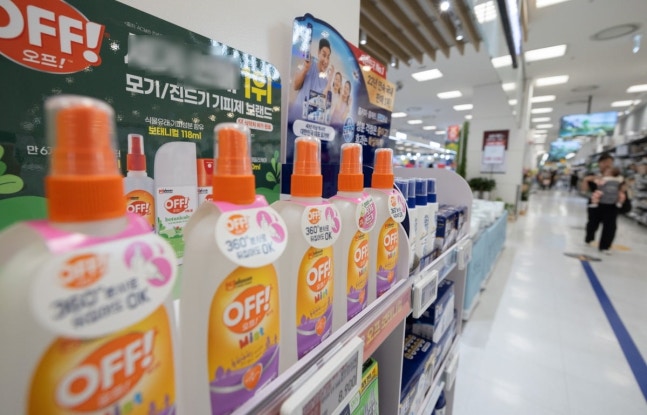Bracelets and stickers have not been proven effective
Check whether it is a medical device or pharmaceutical product and verify the usage instructions during purchase.

That's right. I need to buy mosquito spray. Once we arrive at the campsite, we'll need to spray continuously, so let's buy enough to take with us.
Last weekend, voices calling for mosquito repellents could be heard near the pharmacy inside Seoul Station. Just like this, when going on vacation, the sudden urge to buy such products leads to a surge in demand, and around this time every year, sprays and lotions in the form of mosquito repellents fly off the shelves at train stations and airports. According to GS25 recently, sales of insect repellent and insecticide products, including mosquito repellents, increased by over 70% compared to the same period last year.
As the popularity of mosquito repellents increases, the Korea Food and Drug Administration (hereafter referred to as the MFDS) recently emphasized the importance of checking the recommended age before using mosquito repellents. They also added that there are no bracelet or sticker-type mosquito repellent products available on the market that are classified as quasi-drugs.

According to the announcement by the Ministry of Food and Drug Safety on the 11th, the effective ingredients of mosquito repellents—diethyltoluamide, ikaridin, ethyl butyl acetylaminoproprionate (IR3535), and paramethan-3,8-diol—each have different age restrictions for use depending on the type and concentration of the ingredients.
For example, products containing diethyltoluamide at 10% or less can be used from 6 months of age, but products with ingredient content exceeding 10% up to 30% should be used from 12 years of age. Icaridin is known to be a relatively stable ingredient in the medical community, but it also cannot be used on infants under 6 months. IR3535 should be used on infants under 6 months only after consulting a doctor. Paramentan-3,8-diol can be used from 4 years of age.
A mosquito repellent is a product that does not kill mosquitoes but uses ingredients that mosquitoes dislike to block their approach. Typical forms include liquid sprays or lotions, which are applied by spraying or spreading thinly on exposed skin such as arms, legs, and neck, or on clothing, socks, and shoes.
In addition to mosquito repellents classified as quasi-drugs, products such as mosquito patches in the form of bracelets or stickers are also popular at pharmacies, convenience stores, and supermarkets. In response, the Ministry of Food and Drug Safety emphasized, "There are no approved quasi-drug mosquito repellents in the form of bracelets or stickers."
Bracelet and sticker-type products do not mean they are mosquito repellents. These products typically contain 'fragrance' derived from natural plants such as citronella or eucalyptus. They are merely air freshener products and have not been proven effective by the Korea Food & Drug Administration (MFDS). An MFDS official explained, "Consumers need to be cautious not to mistakenly purchase scented bracelets or stickers thinking they are mosquito repellents."
Professor at Gachon University Gil Medical Center's Department of Family Medicine in Gogi-dong explained that mosquito repellents classified as medical devices may cause allergic or hypersensitive reactions on dry skin or sensitive areas, so they should not be applied directly and it is recommended to use them on clothing or arms and legs as much as possible. He also advised that repellents containing diethyltoluamide can be irritating to the skin, so the recommended age for use must be strictly followed. Additionally, he warned not to keep spray-type repellents near open flames due to the risk of explosion.
Meanwhile, the increasing interest in mosquito repellents is driven by the fact that the mosquito activity season has started earlier and lasted longer. The digital mosquito measuring device (DMS) operated annually by Seoul City has traditionally begun collection on May 1st until 2022, but last year it started on April 15th, and this year it began on April 1st, indicating that the activation period is gradually moving earlier.
According to the "Mosquito Forecast System" operated by Seoul City based on DMS, the average mosquito activity index in Seoul last month recorded the highest value of '100' for 18 consecutive days from the 2nd to the 20th. The average index for the same period last year was 72. It is analyzed that mosquito activity has become more active than usual due to factors such as humidity, rainfall, and temperature.